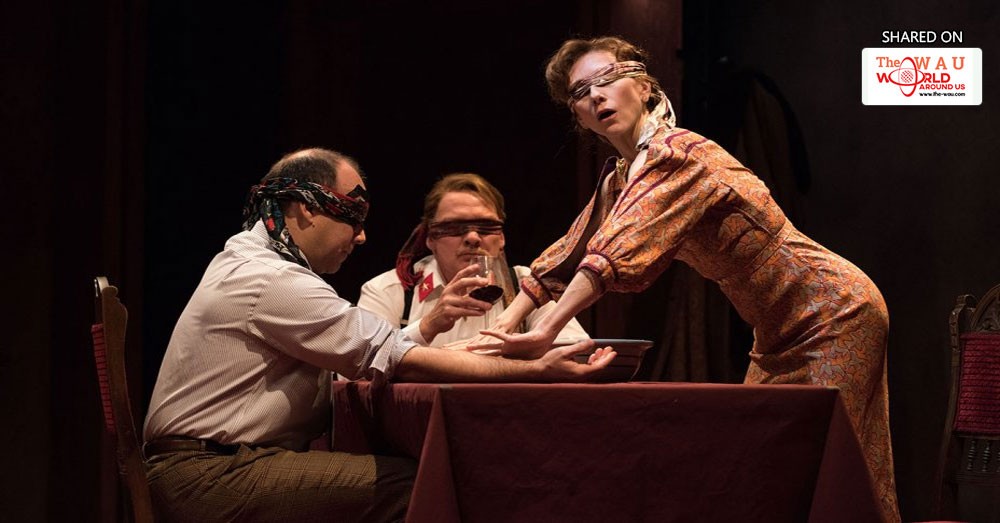Six-time Tony Award nominee Danny Burstein and Zach Grenier of 'The Good Wife' are among the stars of Rajiv Joseph's drama spannng 90 years of Russian history.
Every once in a while, a playwright's ambitions get the better of him. That tendency is on ample display in Rajiv Joseph's new play, receiving its New York premiere at off-Broadway's Atlantic Theater Company. A would-be epic phantasmagoria taking in 90 years of Russian history and featuring characters both real and imagined,
Describe the Night displays no shortage of imagination. But unlike Angels in America, to which this new work has already been compared, it lacks the emotional resonance to make us sufficiently care about its disparate characters. By the time the evening reaches its conclusion after nearly three long hours, you'll feel like you've been through a lot. But not in a good way.
Among the real-figures depicted are famed Russian writer Isaac Babel (Danny Burstein), who was executed by Soviet forces in 1940; and Nikolai Yezhov (Zach Grenier), who rose through the ranks to become the chief of the Soviet Secret Police and, as the play puts it, "Stalin's right-hand man." Yezhov was executed the same year as Babel, although in the playwright's version he went on to live a very long, albeit unhappy life.
The play also features such historical figures as Yezhov's wife Yevgenia (Tina Benko), with whom Babel had a longtime affair, and Vova (Max Gordon Moore), a KGB agent turned politician who bears more than a little resemblance to a certain Russian president.
Got all that? Good, because it gets more complicated from there. The play hopscotches in nonlinear fashion from 1920, when Isaac and Nikolai first meet as soldiers in the Russian Red Calvary, to 2010, when a female reporter (Nadia Bowers) desperately tries to rent a car from a frightened agent (Stephen Stocking) after witnessing the Smolensk plane crash, in which most of the members of the Polish government, including the president and his wife, were killed.
Other scenes take place in 1989, when a young Polish singer (Rebecca Naomi Jones), living in East Germany, seeks to defect to the West; and 1937, when we first see the romantic stirrings between Isaac and Yevgenia that would contribute to sealing his fate.
Joseph, working on a much more expansive scale here than in such previous acclaimed works as Bengal Tiger at the Baghdad Zoo (a Pulitzer Prize finalist) and Guards at the Taj, displays a relish for interweaving his real and fictional characters in complicated and often surprising ways. He plays fast and loose with history to make timely thematic points about a dictatorial society's suppression of the truth, and sometimes does so in an entertaining fashion.
Particularly amusing is the scene in which the KGB agent partakes of some leech soup — you'll have to see the play to hear the disgusting details — that has the side effect of incapacitating him.
But the playwright doesn't succeed at blending his wildly different stylistic tones and narrative lurches with sufficient finesse. For every scene that crackles with dramatic tension, such as when a captive Isaac helplessly begs the vengeful Nikolai not to burn his writings, there's another that quickly lapses into tedium.
The links between the characters (several of whom appear in both younger and older versions) and the complicated series of events depicted often prove frustratingly elusive to decipher. Even when they are fully explicable, they're not terribly satisfying.
The production staged by Giovanni Sardelli feels cramped on the small off-Broadway stage. The drab settings, often consisting of a row of file cabinets and dozens of cardboard boxes, don't provide much visual stimulation, and the frequently dim lighting produces a further soporific effect.
The performers generally handle the material's strenuous demands skillfully, although Burstein's normal charisma seems muted while Grenier has a tendency to go over the top. The standout is Benko, who exudes sensuality as the younger Yevgenia and impish humor as her older self.
A handout provided after the show informs us that the real Yevgenia died of an overdose in 1938 but, much to the play's benefit, the author has ignored that detail. Unfortunately, he felt the need to include far too many other details in this long and unwieldly work.
Share This Post















